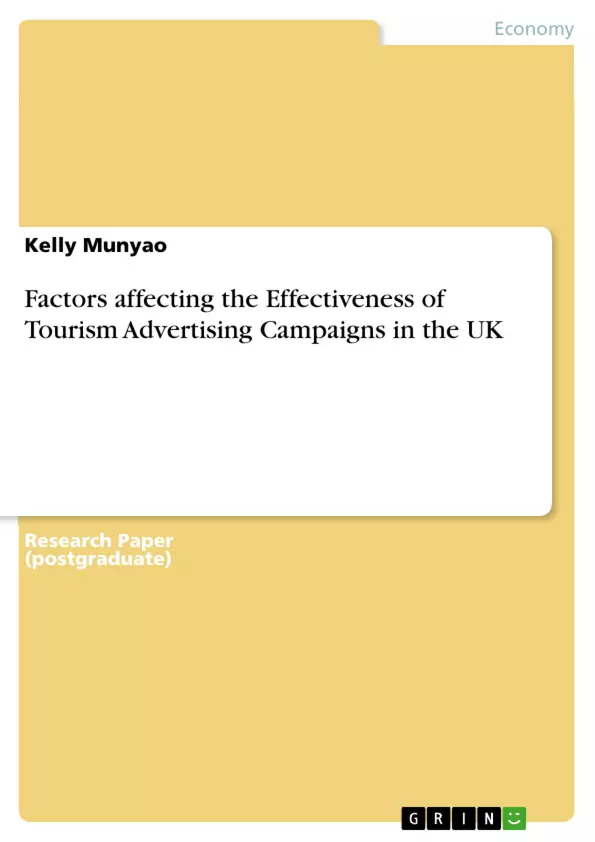Tourism industry in the United Kingdom is a significant industry that contributes heavily to the economy of the United Kingdom in terms of revenue and employment opportunities. The industry is in fact the second largest foreign exchange earner in the United Kingdom. This is because the country has a host of unique features, culture and tradition of its people that attracts tourists. However, the industry faces a lot of competition from the other countries in Asia and the other continents. The industry therefore is expected to effectively market the tourism products in the country. Advertising campaigns is one of the common methods used by the players in the industry to market the industry. The effectiveness of the advertising campaigns is affected by different factors which need to be incorporated so as to enhance its success. This dissertation collects data from the employees and consumers of the United Kingdom tourism products so as to identify the factors that affect the effectiveness of the tourism advertising campaigns. The Visit Britain agency which an agency in charge of marketing the United Kingdom tourism industry to the entire world and also build a visitor economy is used as the case study. The economic status, the media chosen, technology, the characteristics of the target market and demographics, motivations and attitudes of the consumers are the factors identified by the study.
Table of Contents
- Abstract
- 1.0 Introduction
- 1.1 Background
- 1.2 Research Objectives
- 1.4 Research Significance
- 2.0 Literatures Review
- 2.1 Introduction
- 2.2 Tourism Industry
- 2.5 The Advertising Campaign
- 2.5.1 Common Form of Tourist Advertising
- 2.3.2 Cultural Environment and Tourism Advertisement Campaign
- 2.4 Tourism Advertisement
- 2.4.1 Evolution of Tourism Advertisement Campaigns
- 2.4.2 Competitiveness of the Tourism Markets
- 2.5 Destination Marketing and Advertising in the Tourism Industry
- 2.5.1 Destination Image
- 2.6 Tourism Advertisement Campaign in UK
- 2.7 Factors affecting Effectiveness in Tourist Advertisement
- 2.7.1 Demographic Factors
- 2.7.2 Economic Factors
- 2.7.3 Psychological Factors
- 2.8 Summary of the Review
- 3.0 Methodology
- 3.1 Data Collection Methods
- 3.2 Research Ethics
- 4.0 Presentation, Analysis and Interpretation of Findings
- 4.1 Introduction
- 4.1.1 The Case Study
- 4.2 Presentation
- 4.2.1 Participants
- 4.2.2 Type of the Participants
- 4.2.3 Age of the Participants
- 4.2.4 Nature of Employment of the Participants
- 4.2.5 Reasons for the Visit
- 4.2.6 Sources of Information to the Consumers
- 4.2.7 The effectiveness of the source
- 4.2.8 The Managers Response
- 4.3 Analysis and Interpretation of the Findings
- 4.3.1 Identified Factors Affecting the Advertising Campaigns
- 4.3.2 Comparison of the Factors
- 5.0 Summary, Conclusion and Recommendation
- 5.1 Summary
- 5.2 Conclusion
- 5.3 Recommendation
- Reference List
Objectives and Key Themes
This dissertation aims to identify the factors influencing the effectiveness of tourism advertising campaigns in the United Kingdom. Focusing on the Visit Britain agency, the research delves into the impact of various elements on the success of these campaigns.
- The role of advertising in promoting the UK tourism industry
- Factors influencing the effectiveness of tourism advertising campaigns
- The impact of demographic, economic, and psychological factors on campaign effectiveness
- The importance of understanding target market motivations and attitudes
- The impact of technology and media choices on campaign reach and effectiveness
Chapter Summaries
- Chapter 1: Introduction This chapter provides an overview of the UK tourism industry, highlighting its significance to the national economy in terms of revenue and employment opportunities. It also outlines the research objectives and the significance of the study.
- Chapter 2: Literature Review This chapter explores the relevant academic literature on tourism advertising, including the evolution of campaigns, destination marketing strategies, and factors influencing campaign effectiveness. It examines the impact of cultural environment, demographic factors, economic factors, and psychological factors on campaign success.
- Chapter 3: Methodology This chapter outlines the data collection methods used in the research, including primary and secondary data sources. It also addresses ethical considerations involved in the study.
- Chapter 4: Presentation, Analysis, and Interpretation of Findings This chapter presents the findings of the research, including data on the demographics of participants, their motivations for travel, and their perceptions of tourism advertising. It analyzes the factors identified as impacting campaign effectiveness and compares these factors across different groups of participants.
Keywords
The main keywords and focus topics of this dissertation include tourism advertising campaigns, Visit Britain, destination marketing, campaign effectiveness, demographic factors, economic factors, psychological factors, target market, media choices, and technology.
Frequently Asked Questions
How significant is the tourism industry to the UK economy?
The tourism industry is a major economic contributor, serving as the second largest foreign exchange earner and providing significant revenue and employment opportunities across the country.
What is the role of Visit Britain?
Visit Britain is the national agency responsible for marketing the UK tourism industry globally and building a strong visitor economy.
Which factors affect the effectiveness of tourism advertising?
Key factors identified include economic status, media choices, technology, target market demographics, and consumer motivations and attitudes.
How does technology influence tourism campaigns?
Technology impacts how advertisements reach consumers and allows for more targeted marketing, though it also increases competition from other global destinations.
Why is destination image important?
The image of a destination attracts tourists based on perceived culture and traditions. Effective advertising must align this image with consumer motivations to be successful.
- Citation du texte
- Kelly Munyao (Auteur), 2011, Factors affecting the Effectiveness of Tourism Advertising Campaigns in the UK, Munich, GRIN Verlag, https://www.grin.com/document/265579



